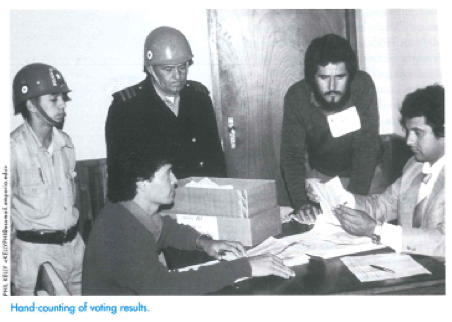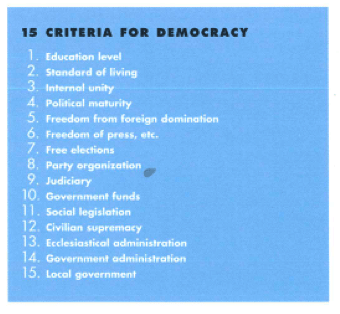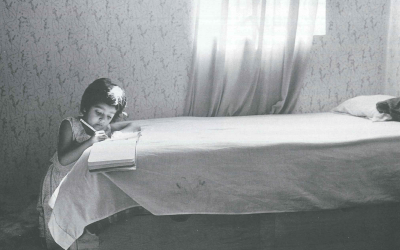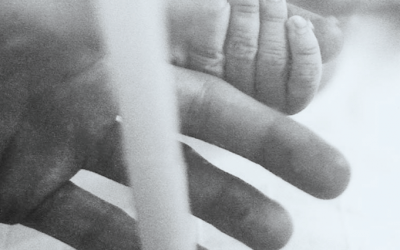Fitzgibbon Survey: Measuring Democracy

As election observers in Asunción, we spent our spare time debating about how we would construct a better government in Paraguay, if given the opportunity. As we rode from interview to interview in our air-conditioned blue and white Latin American Studies Association (LASA) van in May 1989, we pondered what were the crucial elements for democracy. Might they be good leadership, economic prosperity, a mature political culture, better popular education, more experience with democratic processes, absence of major social and ethnic difficulties—or numerous other factors that might lead to and maintain constitutionalism?
Paraguay was holding its first free presidential and parliamentary elections since the military coup several months earlier. General Andrés Rodríguez, the former notorious drug smuggler but current hero who had ousted long-time dictator Alfredo Stroessner, was running well ahead in the presidential polls. He would ultimately win the elections and go on to govern the country for a four-year tenure without seeking re-election. Optimism was in the air. Former exiles, away from Paraguay for years, were returning. Some of them were members of the LASA observer team, including team leader Diego Abente, a professor of political science at Miami University of Ohio, now Paraguayan ambassador to the Organization of American States. Several Paraguayan friends told me how reassuring it was that they could discuss politics in the new more open atmosphere without fear of getting themselves into trouble with the post-Stroessner government.
Yet, as the current administrator of the Fitzgibbon survey of Latin American democracy, a unique system of qualitative measurement of democracy developed by UCLA political scientist Russell Fitzgibbon, I was quite aware of how far Paraguay had to go to become democratic. Since 1945, North American faculty had consistently ranked Paraguay near the bottom in the Fitzgibbon democracy comparisons. But, my experiences in being a part of this election brought home democracy to me at close hand—actually, the ideal of constitutional government being tested during that election in a country lacking democratic traditions and with no indications of a successful future. Unfortunately, Paraguay in my opinion has not succeeded in its quest for better government. It seems to have failed in most of the characteristics my colleagues and I discussed in that election observation experience more than ten years ago.
No doubt, my contribution to the team debates evolved from my involvement in the democracy survey, which itself dates back to 1945 when Fitzgibbon asked a panel of ten distinguished U.S. Latinamericanist scholars to rank the twenty Latin American republics according to a set of criteria that he felt would measure the extent of democracy in each of the countries. He gave scholars 15 criteria (see chart) to assess the strength of democracy, and provided panelists with complete definitions for each of the criteria in addition to the survey instrument.
On a five-point evaluation, panelists were to rate the republics separately according to each of the criteria, and the poll results were tallied later in ordinal and interval data form.
Fitzgibbon replicated his canvas at regular five-year intervals through 1970, adding more panelists than his original ten but maintaining the original fifteen criteria. Kenneth Johnson, a scholar of Mexican politics who was a former student of Fitzgibbon’s, became associated with the project in 1960 and he assumed sole authorship of the 1975 and 1980 polls after Fitzgibbon’s retirement. As the present director of the democracy project, I assisted Johnson in 1985 and administered the instrument alone for the three most recent evaluations, 1991 (one year off schedule because I was a Fulbright lecturer/scholar in Paraguay in1990), 1995, and 2000. In total, twelve democracy surveys, taken every five years and all adhering the Fitzgibbon’s original format, have been conducted since 1945. More than one-hundred panelists contributed to the 2000 survey.
I never met Russell Fitzgibbon, since I began my teaching career near the time of his late-1970s death, but I wish I had. Former students describe him as being that “classical” blend of humanitarian and disciplinarian. Historian David Myers of Pennsylvania State University reminisced to me:
“Fitz cared about his graduate students and went out of his way to give them every opportunity to pursue the career they had chosen. He was intolerant of sloppy scholarship. His criticism was devastating—but never personal. Fitzgibbon did more than any professor in my graduate school career to cure me of any tendency toward unsubstantiated generalizations.”
In 1974, Kenneth Johnson and I were jointly researching undocumented Mexican workers in the Southwest United States. Like Fitzgibbon, Johnson provided supportive mentoring of students and younger colleagues, so he invited me to participate in the Fitzgibbon democracy survey, first as a panelist, and eventually as co-administrator. Today, Ken has been long retired in Hermann, Missouri, where he enjoys exhibiting and selling his crafted baskets and brooms at country and craft fairs in adjoining states.
All three democracy project directors, Fitzgibbon, Johnson, and I, experimented with the poll; most changes were tried only once and not continued. Fitzgibbon gave certain of the fifteen criteria more weight than other criteria, and he also attempted a “self-assessment as to the respondent’s familiarity with both [Latin American] states and the criteria.” Both attempts were inconclusive and dropped. Likewise, Fitzgibbon tested for statistical associations between the democracy scales and an assortment of national attributes, but he found none. Johnson composed a separate political scale drawn from five “select criteria” among the fifteen, and he and Miles Williams created a “Power Index” that sought to measure various groups’ impact on politics. But again, neither innovation was kept. Nor did a later “Attitudinal Profile” of panel respondents’ backgrounds by Johnson and Kelly enjoy long life.

I have attempted several new directions in my current role as survey director. Being an amateur statistician, I utilized a regression analysis procedure in seeking associations between the cumulative survey data and an array of country attributes, finding a predictive “model” in two particular variables, newspaper circulation per capita and tractors per hectare, hence these two variables being tied to democracy. For the 2000 poll I also asked panelists to respond to ranking democracy for the new Caribbean Basin states, although a good number of respondents signaled a lacking of familiarity with this region. Throughout my tenure with the Fitzgibbon survey, I have wanted to expand the number and background breadth of panelists and to circulate the survey data as widely as possible.
The most notable legacy of the Fitzgibbon democracy survey is its long life, fifty-five years and twelve different polls since 1945. No other surveys of its sort can boast of such longevity and repetition over a time span that has seen so many changes and tentative improvements in democracy and government in Latin America. Also, this survey is the only panel-of-experts technique for gauging the extent of democracy, as other assessments of democracy rely on census and other secondary statistical data or a variety of subjective measures. As stated by Fitzgibbon, “[Panel] Specialists are likely to introduce desirable nuances and balances which are impossible in the use of cold statistical information, even of the most accurate sort.” In addition, the canvass possesses both conceptual and operational definitions of democracy, the former rendered in the fifteen criteria and the latter in the survey method itself.

Of course, the Fitzgibbon approach has some inherent problems. Are panelists indeed sufficiently familiar enough with political life in Latin America to gauge accurately the depth of democracy in each of the twenty republics? Most likely not. In addition, despite comparisons made among countries over the years, we yet do not know in general if democracy itself is more grounded of late in the southern hemisphere’s political culture. Likewise, are certain “reformist” and/or radical states, such as Cuba and Nicaragua, given higher scale rankings for democracy because the majority of survey panelists reflect a “liberal” bias, as was seen in the 1985 Johnson-Kelly Attitudinal Profile? Should the poll be made annually or at two-year intervals instead of the five-year rotation, and might certain of the fifteen democracy criteria be eliminated and/or others be given more weight?
Particularly difficulty for me is my weakness in the more advanced statistical realms that could yield deeper insight in democracy trends and causes, for I lack sufficient mathematical skill and institutional support to probe much further into analyzing my data. I’d like to invite interested readers for suggestions as to where to go next with this aspect of the Fitzgibbon project.

Much more could be said about democracy in Latin America and in general. Indeed, is democracy the most efficient form of government, the best protector of citizens’ rights and of the natural environment, or the most peaceful (the “democratic peace” thesis whereby democracies do not war against other democracies)? Can the concept and practice of democracy be accurately defined and compared? Which type of environment is most fertile for the rise and maintenance of constitutionalism? What role has the United States played in the institutionalization of democracy in Latin America? How might any outside country or regional association like the Organization of American States promote political stability and democracy in the more troubled republics? Such queries understandably are difficult to answer, and obviously they are well beyond the scope of both the Fitzgibbon democracy survey and this article.
Nevertheless, the Fitzgibbon democracy survey project has made a positive contribution to the study of Latin American government and politics. According to the panelists’ images, we know the most and the least democratic states, how these rankings have or have not changed over the past fifty-five years, and certain environmental attributes (for instance, per capita newspaper circulation and tractors per hectares) that could be statistically linked to constitutionalism.
So, our LASA team left Asunción after three weeks of immersing ourselves in a people’s historic quest for democracy—in a country where democracy had certainly never before existed. Yet we couldn’t stop asking ourselves: do honest elections make a democracy? As the Fitzgibbon survey attempts to systematically measure, free and honest elections obviously help. Democracy is much more than elections, but as invited guests, we had contributed in observing and supporting Paraguay in its electoral experiment in the path towards democracy. And this certainly made our trip one of value.
Fall 2002
Phil Kelly is a professor of political science at Emporia State University, Emporia, Kansas. Director of the Fitzgibbon democracy survey project, he also serves as secretary-treasurer of the Midwest Association for Latin American Studies. A former Fulbright lecturer/scholar in Paraguay, he researches and publishes on both the Latin American democracy and Latin American geopolitics topics. He wishes to thank Luisa Perez, professor of Spanish also at Emporia State University, for her collaboration and Spanish language translation.
Related Articles
Editor’s Letter: Democracy
Ellen Schneider’s description of Sandinista leader Daniel Ortega in her provocative article on Nicaraguan democracy sent me scurrying to my oversized scrapbooks of newspaper articles. I wanted to show her that rather than being perceived as a caudillo
Battro Named to Pontifical Academy
Antonio M. Battro M.D., Ph.D. has been named to The Pontifical Academy of Sciences, the oldest science academy in the world, established by Galileo 400 years ago. Battro, Robert F. Kennedy…
Entre los panales y el poder
Cuando Jacqueline van Rysselberghe fue informada en Noviembre último que ella debería dejar su puesto como alcaldesa de Concepción, una de las ciudades mas grandes e…




